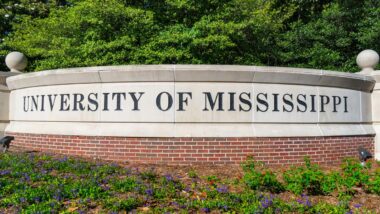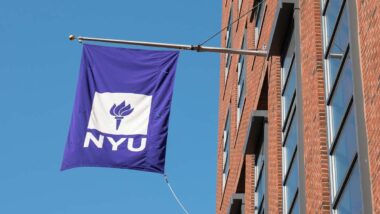Top Class Actions’s website and social media posts use affiliate links. If you make a purchase using such links, we may receive a commission, but it will not result in any additional charges to you. Please review our Affiliate Link Disclosure for more information.
The University of Phoenix, one of the largest for-profit colleges in the U.S., faced charges from the Federal Trade Commission (FTC), alleging that the school harmed students through deceptive advertising, including promises of employment opportunities that the FTC claims were false or overblown. In response, the school agreed to a $191 million settlement to bring an end to these claims.
Some of the money — $50 million — is a cash settlement, but the remaining $141 million is earmarked to cancel student debt for University of Phoenix students who were harmed by the deceptive advertising, according to the FTC.
If you took out federal or private student loans for University of Phoenix classes, you may be eligible to join a class action lawsuit investigation and pursue compensation.
What Employment Promises Were Made for Graduates of a Degree From University of Phoenix?
According to a press release from the FTC, through false advertising in television and radio ads, many students had been promised that a degree from the University of Phoenix would give them valuable connections with major corporations, including AT&T, Yahoo!, Microsoft, Twitter, and the American Red Cross. These ads, according to the FTC, gave the false impression that the school worked with these and other companies to create job opportunities specifically for University of Phoenix students.
The FTC’s lawsuit additionally alleged that the University of Phoenix campaign also gave the false impression to prospective students that the school worked with these and other companies to develop curriculum, creating specific courses at the University for students to take that would prepare them for the jobs that were waiting for them at these companies.
In one of these ads, logos of major companies appear on the screen as a narrator says, “at University of Phoenix, we’re working with a growing list of almost 2,000 corporate partners, companies like Microsoft, American Red Cross, and Adobe, to create options for you.” The campaign ran from late 2012 to early 2014, during the period when the school was still owned by Apollo Education, before both were purchased by private investors in 2016.
The FTC argued that the University of Phoenix had not partnered with these companies, simply used their names and brand recognition to lure prospective students to enroll with false promises of what enrollment would get them.
The University of Phoenix’s ad campaign allegedly targeted certain vulnerable groups in particular, according to Forbes: people of color and military veterans.
The settlement was a major achievement for the FTC, and set an agency record.
“This is the largest settlement the Commission has obtained in a case against a for-profit school,” noted Andrew Smith, Director of the FTC’s Bureau of Consumer Protection. “Students making important decisions about their education need the facts, not fantasy job opportunities that do not exist.”
Why Are Student Loans for University of Phoenix Being Cancelled?
The FTC’s investigation into the University of Phoenix began in 2015. The agency found that some of the school’s advertising to prospective students was deceptive, touting relationships and job opportunities with major companies in a way that falsely promised jobs with a degree from University of Phoenix.
Now, $141 million of the settlement agreement is set to be used to cancel student debt for University of Phoenix students.
An FTC commissioner, Rohit Chopra, noted on Twitter that the “action against University of Phoenix and future actions against scam schools will set the stage for canceling more student debt and terminating bad-actor access to valuable government benefits.”
Unfortunately, while this is a record settlement amount, it is still a “drop in the bucket in terms of the total amount of debt that these borrowers owe,” Seth Frotman, executive director of the nonprofit advocacy group Student Borrower Protection Center, told NBC News. “I think what this case demonstrates is the deep systemic problems that continue to exist in the student loan market and in particular around predatory for-profit schools.
Indeed, in 2018, nearly 100,000 students were enrolled with University of Phoenix, a primarily online institution. At one point, the school had nearly 500,000 students enrolled, though critics said that this rapid growth sacrificed academic integrity and lowered the educational standard of the school, according to a Senate report.
The University of Phoenix maintains that the settlement agreement was over “a single advertisement campaign that ran from late 2012 to early 2014 and occurred under prior ownership.” The university maintains that it “acted appropriately,” but says the settlement agreement will allow the institution and its students to move on.
“This settlement agreement will enable us to maintain focus on our core mission of improving the lives of students through career-relevant higher education, and to avoid any further distraction from serving students that could have resulted from protracted litigation, as well as the time and expense of the litigation itself,” the university said in a statement.
 Are You Eligible for University of Phoenix Loan Forgiveness?
Are You Eligible for University of Phoenix Loan Forgiveness?
Students who were enrolled in the University of Phoenix between October 1, 2012, and December 31, 2016, can expect their outstanding balances with the university specifically to be automatically forgiven. According to the FTC, these students do not need to contact the school or the commission to set their University of Phoenix debt forgiveness in motion. The school will be sending letters and emails to eligible borrowers informing them they no longer owe school payments.
However, the settlement does not include federal and private loan obligations. Indeed, student loans for University of Phoenix students have not been forgiven with the settlement — just debt with the school itself.
Loan forgiveness under the Trump administration and Education Secretary Betsy DeVos has been limited. On the same day as the FTC’s enforcement action against the University of Phoenix, Secretary DeVos announced her department’s alternate approach to loan forgiveness from the Borrower Defense to Repayment rule that had been adopted under the Obama Administration. Secretary DeVos’s plan will limit loan forgiveness to only partial amounts, to be determined by a formula.
“While Education Secretary Betsy DeVos continues to make it easier for predatory education companies to recruit and rip off students, the FTC has proven that they have the backs of the borrowers of their families,” said Whitney Barkley-Denney, a senior policy counsel with the Center for Responsible Lending (CRL), according to The Chicago Crusader. “The students defrauded by the University of Phoenix deserve nothing less than full loan forgiveness from the Department.”
If you were a student, you may be eligible for University of Phoenix loan forgiveness through a class action lawsuit.
How to Join a University of Phoenix Lawsuit
If you were enrolled between October 1, 2012, and December 31, 2016, and had outstanding debts with the university itself, these debts should automatically be forgiven. But if you have taken out student loans for University of Phoenix classes, either federal or private, the settlement does not cover these loans.
Students who are residents of Texas or California that were misled by the University of Phoenix’s alleged false advertising regarding job opportunities for graduates, and did not get a job in their field after graduation, may be able to join a class action lawsuit investigation.
Filing a lawsuit can be a daunting prospect, so Top Class Actions has laid the groundwork for you by connecting you with an experienced attorney. Consulting an attorney can help you determine if you have a claim, navigate the complexities of litigation, and maximize your potential compensation.
Join a Free University of Phoenix Class Action Lawsuit Investigation
If you are a Texas or California resident and were misled by University of Phoenix’s representations about job prospects, and did not get a job in your field of study after graduation, you may be eligible to join a FREE University of Phoenix lawsuit investigation.
This article is not legal advice. It is presented
for informational purposes only.
ATTORNEY ADVERTISING
Top Class Actions is a Proud Member of the American Bar Association
LEGAL INFORMATION IS NOT LEGAL ADVICE
Top Class Actions Legal Statement
©2008 – 2024 Top Class Actions® LLC
Various Trademarks held by their respective owners
This website is not intended for viewing or usage by European Union citizens.


 Are You Eligible for University of Phoenix Loan Forgiveness?
Are You Eligible for University of Phoenix Loan Forgiveness?













64 thoughts onWhy Are Some Student Loans for University of Phoenix Being Cancelled?
I was able to go on the FTC website to look up the information. Apparently, the checks were sent out. The university sent out a letter stating that I should be hearing from FTC (this was a while back, maybe March?). So far no check.
Please add me to the list. I attended UOP from 2008-2012 where I earned a BSIT, I never received any job assistance and I am working at a school as a teacher’s aide that pays 25,000 a year. I cannot afford to pay back 68,000 in student loans. UOP did not assist with getting any of the certifications I need to go along with my degree. They also did not provide any type of internship program or a mentor to assist me in my career path.
I attended UOP and the school was saying I owed them as well as my loans. Please send me information as well.
I am an online student from UOP and was deceived that l can graduate 3yrs from my bachelors degree because l already had an associate degree from another country,the assessment said it won’t be long,n it took me 4yrs and the school deceived me about the helping find a job and never explain how student loans work,not a clue, graduating there didn’t help,can’t find any help now ask anybody about how to transition and how job market is. All they want is money
Addendum:l started 2010 n graduation is 2014, owes a lot of money because of deception,I’m always having an anxiety attack due to this expensive tuition n loans that are ballooning due to interest,also,they sent a foreign financial adviser to me which one time l don’t even understand her.
I graduated from UoP in 2014 with an Associate of Arts, concentration in Information technology. Here I am, 7 years later, still working as a helpdesk technician for less than $16 an hour! I can’t afford to pay the $51k+ student loans, 40k of which came from Uop.
As a result, I ran out of student loans before I could complete my Bachelor’s degree at another school. Here I am 6 credit hours away from a BSIT and can’t afford to complete my degree, let alone pay to keep up with the certifications I earned through another program.
Paying the minimum amount doesn’t get me anywhere because it’s only applied to interest. I am so angry that I made the huge mistake of being sucked in by the ads promising a better future. I have no more earning potential now than I did without the degree.
I was not able to graduate with my Bachelor’s in Accounting because University of Phoenix accumulated so much debt I didn’t qualify for more loans to complete the program. I was a couple classes shy of obtaining my degree. They are way to costly and do not provide the necessary assistance to the students to complete the programs or have a career opportunity.
Can you tell me how to file calim i was student of msa from 2010 to 2013.
I am in the same boat as many, seeking assistance. I have endured so much financial hardship as a result of debt incurred for a doctoral degree from UOP. I graduated in 2011. It took 6 years to finish my program. My credit is severely damage as I chose settled my private student loan debt with the University of Phoenix – School of Advanced Studies. What I failed to realize is that each disbursement I received was tied to a separate loan with a separate servicer. The financial impact of all loans being due slightly before graduation was horrific. Not only did my loans get forwarded to various attorneys and collection agencies, but I was financial impacted on my federal taxes, I had huge tax penalties. I have paid as much as $2500 a month to settle my debt with servicers such as AES, NCT, Chase and Walter Wiesberg and Ries. At this time, all settlements have been satisfied (there are several). However, I STILL owe over $100K in federal student loans. I am a veteran who used my GI Bill for my undergraduate degree. A very large part, if not all, of my private student loan debt was associated with UOP. I do work but my credit has been/will affect my clearance. Is there any help for me? This is a horrific nightmare that I can’t wake up from.
I just want forgiveness because this is one of the most expensive online college. I started out but slip in the early postpartum depression and was sick while attending classes. I was afraid to fail but i had to put my child and myself health first.
I got my bachelor in business please include me